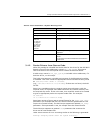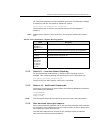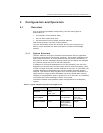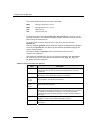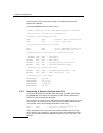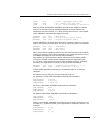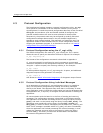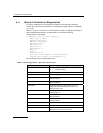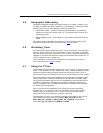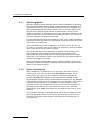
Dialogic
®
DSI SPCI Network Interface Boards Programmer's Manual Issue 5
21
4.2 System Configuration
System configuration is handled by the program gctload, which reads the
system configuration data from a file called system.txt. This file must be
edited to reflect the requirements of your system, prior to running gctload.
System initialization requires first that a pool of message buffers is created
for subsequent inter-process communication. Secondly, that a message
queue is created for each process that runs and that any message re-
direction for modules that are running remotely is initialized. Then all
processes can be started.
The program gctload exists to handle this initialization sequence and to
create the inter-process communication environment. It reads input from the
text file called system.txt, carries out all system initialization and starts up
all processes. system.txt is a user configurable file containing details of all
the module identifiers known to the system, details of whether they are local
modules or remote modules accessed by a local module (message
redirection), and lists the command line for all processes to be started by
gctload.
gctload creates a message queue for each of the local module identifiers. It
subsequently expects a process to service its message queue otherwise
messages written to that queue will never be read, causing eventual loss of
system messages.
gctload initializes the message queue look-up table so that messages
destined for modules that do not exist locally are re-directed to a message
queue for a module that does exist locally.
Having created the system environment, gctload proceeds to spawn all
processes listed in the system.txt file in the order listed.
4.2.1 System Configuration File Syntax
The system configuration file system.txt is a text file used by gctload to
configure the software environment.
The file syntax permits the use of comments to improve the readability of the
file. Comments are inserted into the file by using an asterisk *; all characters
on the line after the asterisk are ignored.
Numbers can be entered in either decimal or hexadecimal format.
Hexadecimal numbers must be prefixed with 0x. For example, the value
eighteen can be entered in either of the following formats:
0x12 *(Hexadecimal)
18 *(Decimal)
The System Configuration File contains the following commands:
a) LOCAL commands to allow gctload to generate message queues
for modules running locally.
b) REDIRECT commands to cause messages generated for modules
not running locally to be redirected via a module that is running
locally.
c) FORK_PROCESS commands advising gctload of any processes
that need to be started locally.





